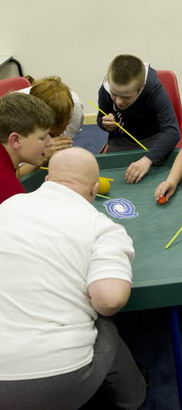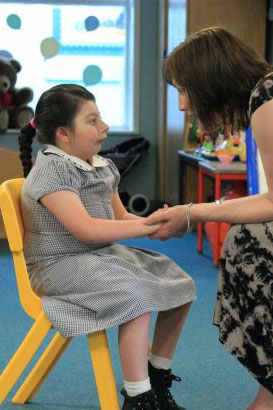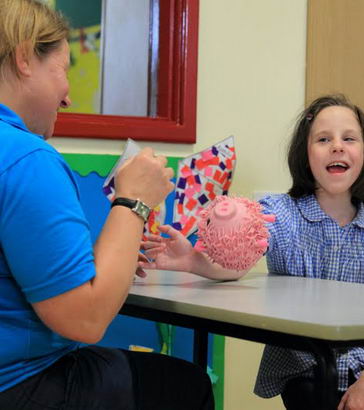
- Piaget's theory of the sensory-motor foundations for all learning and development has not been contested. It is generally acknowledged that the foundations of meaningful understanding of the world lie in physical engagement with the environment. Sharing attention on an object will be the start of making and sharing meanings with others.
- Any learning programme geared at children with SLD/PMLD/CLDD fundamentally has to take this into account – even if the child appears capable of more advanced conceptual engagement (as in the case of children with autism), they may not have a consolidated understanding – typical early learning experiences and the chance to engage in exploratory play may have been disrupted for a range of reasons.
In the case of children with SLD/PMLD/CLDD, their biological make-up
may significantly influence their finite capacity for acquiring fluent, meaningful and relevant understanding and use of the
language of their community. The brain is plastic however, and there will therefore be scope to influence and maximise a child's
overall life chances in becoming
a communicator.

- Emphasised the importance of adults and relationships: the social and cultural context.
- Emphasised pragmatic aspect of language: to get things done, to make sense of the world.
- Adults scaffold the child's acquisition of language – Language Acquisition Support System (LASS – Bruner).
- Language will be influenced by the cultural conventions of the time.
The importance of the adult effectively mediating learning for the child with SLD/PMLD/CLDD will be crucial. This will require detailed knowledge by the adult of small steps to development, in order to respond flexibly to shape learning towards an end goal, and sensitive attunement to gauge how to extend the child and when to time this.

More recently still, according to psychologists such as Barbara Rogoff, children should be considered as co-constructors of knowledge and understanding. This view combines three important tenets:
- An endorsement of Vygotsky's view on the relationship between cognitive development and learning as interactive.
- An acknowledgement of shifting power relationships, that sees the child as a participant in the learning context.
- An emphasis on the significance of the quality of classroom talk for communicative and social processes in learning.
Interactionism is an important challenge to educators working with the child with SLD/PMLD/CLDD. How do we enable them to direct their own learning? How do we follow their lead and negotiate their learning pathway? How do we involve them in assessing their achievements? Aspects of this type of approach should consider:
- Active learning – 'learning by doing', discovering, exploring, individual achievement.
- Taking control and responsibility – a shift in the teacher-pupil relationship, making choices and influencing decisions.
- Sociability and communication – collaboration, negotiation, positive ethos (emphasis on diversity), range of options/possibilities.
- Metacognition – explicit reflection by the pupil(s), evaluation, adjusting responses, awareness of oneself as a 'thinking agent'.

- Learning is contingent on good relationships.
- There is sensitivity to feedback from the learner.
- Emphasis on positive regard, respect, negotiation and participation.
- Quality of the experience is as important as the objective.
- Emphasis on understanding to bring about changes in behaviour.
- Intrinsic motivation is its own reward.
- It is not the learner who fails – the teacher has failed to provide an adequate learning opportunity.

Bruner, J. S. (1966) Toward a Theory of Instruction. Cambridge, Mass.: Belkapp Press.
Crosby, K (2002) Communication through music for pupils with profound and multiple learning difficulties, SLD Experience, Spring, pp 19-21.
Rogoff, B. (2003). The Cultural Nature of Human Development. New York: Oxford University Press.
Vygotsky, L. S. (1978). Mind in society: The development of higher psychological processes. Cambridge, MA: Harvard University Press.